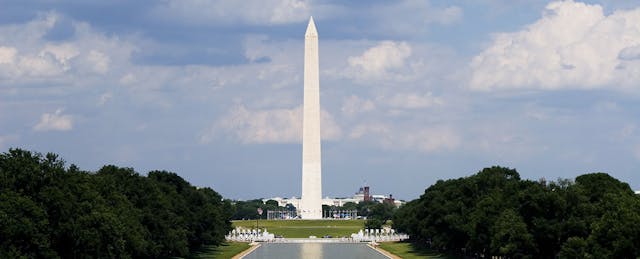Pittsford Mendon High School in New York was eerily quiet on Nov. 9, 2016—the day after the U.S. election. Students and faculty—regardless of who they voted for—resided in a moment of shock after a man whom very few thought stood a chance, Donald Trump, was elected president.
“It was very tense when we got to school that day,” recalls Colleen Sheller, a senior at Pittsford Mendon High School. “There were some kids and teachers who felt very afraid about what was going to happen next.”
But today, more than two months after the election, Sheller and nearly 50 other seniors from her high school will be standing at the National Mall in Washington, watching one of the most historic elections unfold.
“This is an authentic lesson in democracy and it’s going to be a lifelong memory,” says Allan DeCarlo, a history and AP government teacher at Pittsford Mendon High School who will be with his students at the inauguration.
A teacher for nearly 30 years, DeCarlo has taken students on trips to the nation’s capital plenty of times before. They usually go on Memorial Day. However, when planning for the trip last year, some students requested they bump the visit up a few months. “Our AP government kids last year said, ‘wouldn’t it be cool to go and see a historic inauguration?!’” DeCarlo recalls.
What they had in mind for “historic,” however, wasn’t exactly what happened in November. “They were expecting to see Hillary [Clinton] win,” he explains. “Their idea was the first women president.”
In the weeks and months leading up to the election, DeCarlo kept his class diligently studying the polls. They looked at swing states, analyzed counties and factored in past election results to make evidence-based guesses about who might win. But the students’ polling predictions—like the media's—were off.
“We all expected [Clinton] would win—even Trump supporters,” Sheller says. “It was disappointing and a big shock.”
At this point, deposits had already been submitted for the trip. But some students began having second thoughts about attending the inauguration. DeCarlo had students who identify as LGBTQ and Muslim—groups that Trump and his cabinet have openlyattacked—come to him saying they no longer wanted to go. Some students wanted a refund, and others talked about canceling the trip altogether.
The students weren’t alone. Since November, a list of celebrities have declined the invite to perform at the inauguration. It took nearly two months before a majority of America’s former presidents would confirm their attendance, while numerous lawmakers and other public figures have stated they will be boycotting the event entirely. Even local high school marching bands, which have played for past inaugurations, chose not to perform this year.
But DeCarlo insisted, saying he never doubted bringing his students to the event—even after the candidate he voted for lost.
“I never questioned it. It's historical no matter what,” he states. “My job is to foster the knowledge of public service and what it means to be political. Our goal is to keep [students] open minded, especially in this extreme climate.”
Vulgar rhetoric and heated debate aside, DeCarlo feels it's been a ripe year to teach American government. (He’s written about how he's done it, too.)
“In class, we talk about who [Trump] surrounds himself with and the bureaucracy and his business interest. We have kids who disagree fundamentally,” he says. But the debate has stirred conversations around what it means to live in a democracy. “It’s the best year to take American history and government, and I wouldn't say that it was any better or worse if the results were different.”
After allowing some time to pass, each student who originally signed up eventually decided to stick to the plan. It didn’t take much convincing, DeCarlo underlines, though students will be there for different reasons: some to support Trump and others to watch the anti-Trump demonstrations taking place. Not far from where the students will be watching the inauguration will also be one of the largest political protests in U.S. history—the Women’s March on Washington.
As a government teacher, DeCarlo explains that he’s just as excited about his students being a part of a peaceful transfer of power as he is about them witnessing the massive protests planned.
“I hope we do see protests and America at its best: non-violently protesting or non-violently supporting the President-elect,” DeCarlo highlights. One of his students, whose mother will be at the Women’s March on Washington, will even be staying longer to participate in some of the activism happening. “It’s great,” says DeCarlo. “I'm really excited for her.”
Of course, not all students were disappointed by the results. Philip Kelly, a senior at Pittsford Mendon High School who voted for Donald Trump, is looking forward to seeing the candidate he choose take the stage.
“I’m happy that the person I voted for [won],” says Kelly. “But this is something that not a lot of people have an opportunity to [experience]… I would want to go no matter who won.”
Sheller, who wants to study politics in college and says she would have voted for Clinton if she were 18 at the time of the election, is looking forward to the trip as well, and to experience the lessons she’s been learning all year.
“We see so much stuff online and on the news, and I think sometimes we don’t process what is happening until we see it firsthand,” she says. “It’s such an amazing learning opportunity to go and see what we are learning about and how this all really works.”


